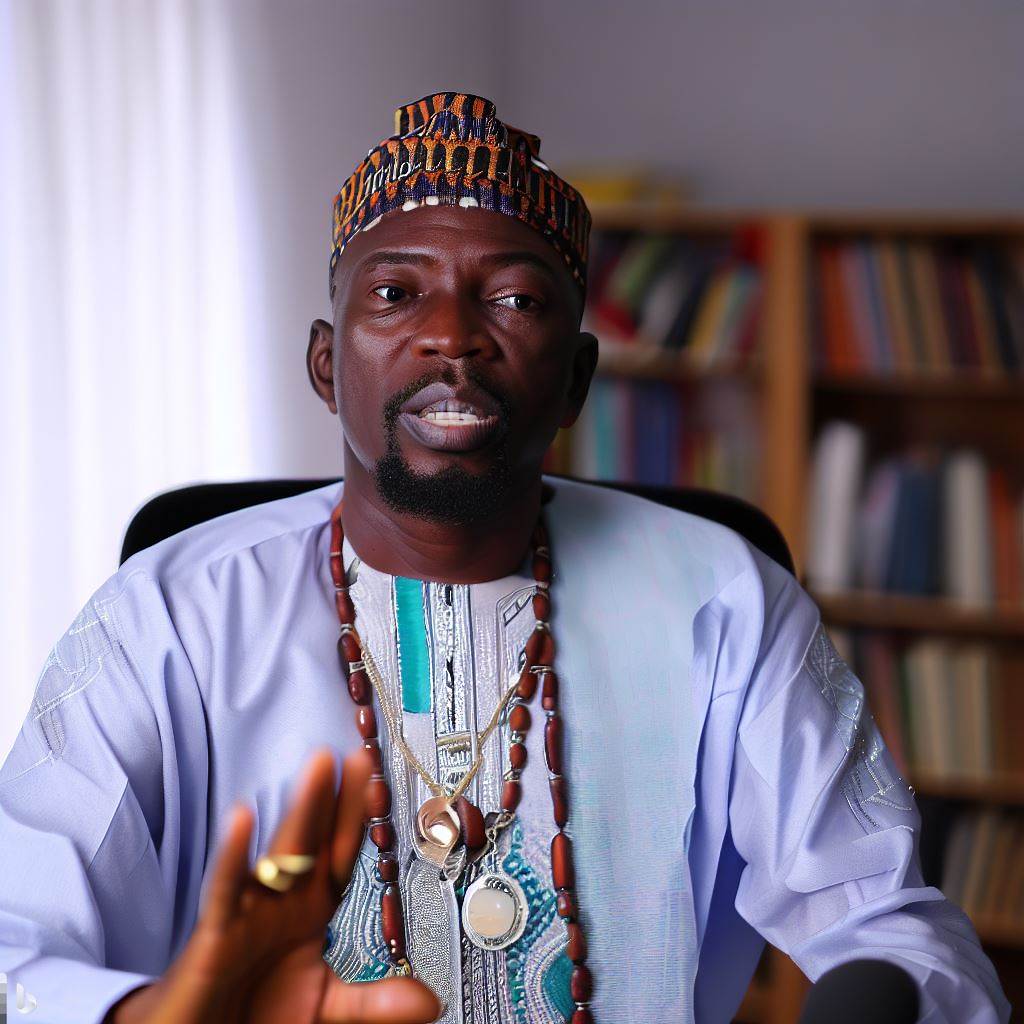Introduction
Delve into the world of a Nigerian professional counselor and discover the significance of their role in supporting individuals’ well-being.
Professional counseling plays a vital role in Nigeria, offering a guiding light for those seeking emotional and mental support.
This blog post aims to provide a glimpse into the daily life of a Nigerian counselor, shedding light on their responsibilities, challenges, and the profound impact they have on the lives they touch.
As we journey through their typical day, we’ll gain insights into the diverse cases they handle, the strategies they employ, and the empathetic approach they bring to their practice.
Join us in unraveling the multifaceted role of a Nigerian professional counselor and understanding how their dedication contributes to fostering mental health and resilience in the community.
A Day in the Life of a Nigerian Professional Counselor
In bustling Lagos, I rise early, energized.
First client’s session focuses on stress management, active listening fosters connection. Midday, I lead a group workshop, addressing communication skills.
Afternoon, a teenager discusses exam anxiety, coping strategies proposed.
Evening brings a couple grappling with relationship dynamics, empathy guides solutions.
Reflecting on the day, I find fulfillment in guiding fellow Nigerians toward emotional well-being.
importance of professional counseling in Nigeria
In Nigeria, professional counseling plays a pivotal role in fostering mental and emotional well-being.
Trained counselors offer a safe space for individuals to share their struggles, guiding them towards healthier coping strategies.
This support is especially crucial given the rising stressors in today’s fast-paced society.
With tailored guidance, individuals can navigate challenges, manage stress, and make informed life choices.
Counseling also addresses stigmas surrounding mental health, promoting open discussions. By enhancing self-awareness, counseling empowers Nigerians to lead fulfilling lives.
It strengthens relationships, be it in families, workplaces, or communities, fostering harmony. In schools, counseling aids students’ academic performance and personal growth.
Responsibilities of a Nigerian professional counselor
This blog post aims to provide readers with an intimate look into the daily routine and diverse responsibilities of a professional counselor in Nigeria.
Exploring challenges, rewards, and activities, this post illuminates how Nigerian counselors crucially impact the nation’s mental health landscape.
Whether you’re pondering a counseling career or curious about Nigerian counselors’ daily life, this article imparts valuable insights, fostering appreciation.
Qualifications and Training
1. Educational requirements for becoming a professional counselor in Nigeria
- Completion of a Bachelor’s degree in Counseling, Psychology, Social Work, or a related field.
- Some employers may require a Master’s degree in Counseling or a specialized counseling discipline.
2. Certification and licensing processes
- After completing the required education, aspiring counselors must obtain certification from recognized counseling bodies in Nigeria.
- Some of the prominent bodies include the Nigerian Counselling Association (NCA) and the Counselling Association of Nigeria (CASSON).
- Applicants must fulfill specific criteria, such as supervised practical experience and passing a certification examination.
- State licensing boards also regulate the practice of counseling, requiring counselors to obtain a license to practice legally.
3. Importance of ongoing professional development and training
- Continuous professional development is essential for counselors to stay current with the latest research, techniques, and ethical practices.
- Counseling is a dynamic field, and new approaches and interventions are continually being developed.
- Attending workshops, conferences, and seminars helps counselors enhance their skills and broaden their knowledge base.
- Continuing education also helps counselors maintain their certifications and licenses.
- Through ongoing training, counselors can sharpen their therapeutic abilities and better serve their clients.
Becoming a professional counselor in Nigeria requires completing the necessary educational qualifications, obtaining certifications and licenses, and engaging in ongoing professional development.
It is an ever-evolving field that demands continuous learning and enrichment.
By acquiring the essential skills and expertise, counselors can make a positive impact in their clients’ lives and contribute to the growth of the counseling profession in Nigeria.
Read: How to Become a Medical Lab Technician in Nigeria
Start of the Day
Describe the typical morning routine of a Nigerian professional counselor
- A typical morning routine for a Nigerian professional counselor starts with waking up early.
- They understand the importance of self-care and personal well-being to maintain a healthy mindset for counseling sessions.
- Before starting their day, they take time for themselves, practicing mindfulness or engaging in physical exercise.
- This helps them to clear their mind and focus on their clients’ needs.
- They also prioritize a healthy breakfast, knowing that it provides the energy needed for the demanding day ahead.
- Once they feel refreshed and nourished, they begin the preparation process for the day’s counseling sessions.
- Reviewing client files is an essential step to ensure they are fully informed about each individual’s situation.
- They pay attention to details, making notes that will assist them during the sessions.
- Moreover, they make sure to organize necessary resources, such as handouts or worksheets.
- These materials can enhance the counseling process and make it easier for clients to understand.
- They prioritize creating a peaceful and welcoming environment in their office.
- This includes arranging comfortable seating, having calming decor, and ensuring privacy for all clients.
- They also check their calendar and confirm all scheduled appointments, avoiding any overlaps or misunderstandings.
- In addition to physical preparation, Nigerian professional counselors mentally prepare themselves for the day.
Overall, the morning routine of a Nigerian professional counselor encompasses self-care, preparation, and dedication to provide effective counseling sessions.
Read: Overcoming Barriers in Nigerian Dental Education
Counseling Sessions
A professional counselor in Nigeria conducts various types of counseling sessions to cater to the diverse needs of their clients.
Counseling Sessions That A Professional Counselor In Nigeria May Conduct
1. Individual Counseling Sessions
- These sessions involve one-on-one interactions between the counselor and the client.
- They provide a safe and private space for clients to discuss their personal issues.
- Individual counseling sessions are highly beneficial for addressing personal problems like anxiety, depression, and self-esteem.
- The counselor uses techniques like active listening, empathy, and reflection to help the client gain insight and make positive changes.
2. Group Counseling Sessions
- In these sessions, the counselor works with a small group of individuals facing similar issues.
- Group counseling allows clients to share their experiences, provide support, and learn from the challenges faced by others.
- It promotes social interaction, empathy, and personal growth among the participants.
- The counselor may incorporate activities and exercises to enhance communication and problem-solving skills.
3. Family Counseling Sessions
- Family counseling focuses on resolving conflicts, improving communication, and achieving harmony within the family system.
- The counselor involves all family members in the therapeutic process.
- It helps in addressing issues like parent-child relationships, marital problems, or family trauma.
- The counselor utilizes techniques like role-playing, genograms, and family sculpting to facilitate understanding and healing.
Read: How to Become a Diagnostic Medical Sonographer in Nigeria
Maintaining a safe and confidential space for clients is of utmost importance in counseling sessions.
The clients should feel secure and comfortable, knowing that their personal information will not be shared without their consent.
Confidentiality builds trust between the client and the counselor, enabling clients to open up more freely.
Professional counselors adhere to ethical guidelines and legal obligations to protect their clients’ confidentiality.
The Various Counseling Techniques And Methodologies
Counselors in Nigeria use a variety of counseling techniques and methodologies to address the needs of their clients.
Some commonly used approaches include cognitive-behavioral therapy (CBT), psychoanalysis, and solution-focused therapy.
CBT focuses on identifying and modifying negative thoughts and behaviors to promote mental well-being.
Psychoanalysis delves into the unconscious mind to uncover unresolved conflicts and childhood experiences.
Solution-focused therapy emphasizes finding solutions rather than dwelling on problems, promoting positive change.
Counselors adapt their approach based on the individual needs and preferences of their clients.
Each counseling session is unique, aiming to provide support, guidance, and a pathway towards personal growth and well-being.
By offering different types of counseling sessions and employing various techniques, professional counselors in Nigeria play a vital role in helping individuals, groups, and families navigate through life’s challenges and achieve emotional and psychological wellness.
Read: Essential Skills Needed for a Nutritionist in Nigeria

Crisis Intervention
As a Nigerian professional counselor, there are various potential situations where crisis intervention becomes necessary. These situations can vary from individual to community-level emergencies.
Potential Situations Where A Nigerian Professional Counselor May Have To Handle Crisis Intervention
1. Personal Crisis
When individuals experience a personal crisis, such as a traumatic event, loss of a loved one, or suicidal thoughts, a counselor’s intervention is crucial. In these cases, the counselor will utilize their training and expertise to provide immediate support.
2. Domestic Violence
Addressing domestic violence situations is another crucial aspect of crisis intervention for Nigerian professional counselors. They must assist victims in accessing emergency resources, including safe shelters and legal aid.
3. Substance Abuse
Counselors need to intervene in cases of substance abuse, offering immediate assistance to individuals struggling with addiction. They may provide guidance on joining support groups or recommend inpatient or outpatient rehabilitation programs.
Steps Taken to Assess and Address Urgent Mental Health Concerns
When it comes to assessing and addressing urgent mental health concerns, Nigerian professional counselors follow a systematic approach.
- Immediate Assessment :The first step involves conducting an immediate assessment of the crisis situation.
This includes evaluating the severity of the issue and any potential risks to the individual’s safety and well-being. - Active Listening and Support : During crisis intervention, active listening plays a crucial role.
Counselors provide a safe space for individuals to express their emotions and concerns while offering support and empathy. - Crisis Management Techniques : Counselors employ crisis management techniques to de-escalate situations and help individuals regain control.
These techniques may involve deep breathing exercises, grounding techniques, or redirecting negative thoughts.
Importance of Collaborating with Other Healthcare Professionals and Organizations
In crisis situations, it is essential for Nigerian professional counselors to collaborate with other healthcare professionals and organizations.
- Holistic Approach : By collaborating with doctors, psychiatrists, and social workers, counselors can ensure a holistic approach to crisis intervention.
This ensures that individuals receive comprehensive care for both their mental and physical well-being. - Resource Sharing : Collaboration also enables the sharing of resources and knowledge, allowing counselors to connect individuals with the appropriate support services, like medication management or legal assistance.
- Strengthening Support Networks : Through collaboration, counselors can strengthen support networks by involving community organizations and groups.
This helps create a robust system of care and increases the chances of long-term recovery.
Generally, crisis intervention is an essential aspect of the work done by Nigerian professional counselors.
By addressing mental health concerns, and working with healthcare professionals, they aid individuals, and communities in crises, fostering resilience.
Read: Understanding the Ethics of the Nutritionist Profession in Nigeria
Administrative and Documentation Tasks
Administrative Tasks
As a Nigerian professional counselor, my day begins with a range of administrative tasks that are crucial for smooth operations. These tasks ensure efficient scheduling, communication, and organization.
- Scheduling Appointments: One of my primary responsibilities is to manage my clients’ appointments effectively. I carefully allocate time slots to ensure that each session is given adequate attention.
- Responding to Emails: Communication plays a vital role in counseling, and I make it a point to promptly respond to client emails. This helps establish trust and assures clients that their concerns are heard.
- Maintaining Client Records: Another significant aspect of my administrative tasks is managing and updating client records. This involves documenting relevant information, such as personal details and session notes.
Legal and Ethical Obligations
Being a professional counselor in Nigeria comes with legal and ethical obligations that are crucial to ensuring the well-being and privacy of clients.
- Client Confidentiality: Upholding client confidentiality is a core principle in counseling. I follow strict guidelines to safeguard client information and maintain their trust and privacy.
- Informed Consent: Prioritizing informed consent is essential. I explain the counseling process, goals, and potential risks to clients, ensuring they fully understand and can make informed decisions about their treatment.
Importance of Documentation
Accurate and organized documentation is vital in the field of counseling. It serves multiple purposes and allows for effective treatment and professional accountability.
- Quality of Care: Thorough documentation helps me provide the best care possible. It enables me to track clients’ progress, assess the effectiveness of interventions, and make informed decisions regarding their treatment.
- Continuity of Care: Proper documentation ensures a smooth transition between sessions and allows for collaboration with other healthcare professionals if necessary. This ensures clients receive holistic care.
- Professional Accountability: Maintaining accurate records demonstrates professionalism and accountability. It allows me to ensure I am meeting ethical and legal standards and keeps me accountable for the care provided.
Administrative and documentation tasks are vital components of a Nigerian professional counselor’s day.
Scheduling appointments, responding to emails, and maintaining records enhance counseling’s effectiveness, promoting ethics and confidentiality.
Read: Networking Opportunities for Cardiovascular Technologists in Nigeria
Continuing Education and Professional Development
Highlight the significance of ongoing learning and professional growth for Nigerian professional counselors
Professional growth and ongoing learning are essential for Nigerian professional counselors.
As professionals in the field of counseling, it is crucial to stay updated with the latest research, practices, and techniques.
Here are various ways counselors can enhance their knowledge and skills:
- Continuing Education Courses: Nigerian professional counselors can enroll in continuing education courses related to their areas of expertise. These courses provide opportunities to learn and gain new insights.
- Professional Conferences: Attending conferences allows counselors to network, learn from renowned experts, and stay updated on emerging trends and best practices in the field.
- Workshops and Trainings: Participating in workshops and trainings keeps counselors informed about advancements in counseling techniques and interventions. It helps them enhance their counseling skills.
- Webinars and Online Resources: Utilizing webinars and online resources enables counselors to access valuable information and learn from experts without geographical limitations.
- Journal Subscriptions: Subscribing to counseling journals helps counselors stay informed about the latest research studies and breakthroughs in the field.
- Peer Supervision or Consultation: Engaging in regular peer supervision or consultation sessions allows counselors to discuss cases, seek guidance, and receive feedback from experienced colleagues.
- Joining Professional Organizations: Becoming a member of professional counseling associations provides counselors with access to resources, workshops, and opportunities for professional networking.
- Continuing Professional Development Plans: Creating personalized development plans helps counselors identify areas they want to improve and set goals to enhance their skills.
Discuss the various ways counselors can stay updated with the latest research, practices, and techniques in the field
Counselors can ensure they stay abreast of the latest research, practices, and techniques in the field through a variety of approaches:
- Continuing Education Workshops: Attending workshops, seminars, and conferences provides opportunities to learn about emerging research and innovative practices directly from experts.
- Professional Organizations: Joining counseling associations and organizations offers access to resources, publications, and networking opportunities to stay informed.
- Online Resources: Utilize reputable websites, journals, and databases to access recent research articles, case studies, and whitepapers.
- Webinars and Online Courses: Participate in webinars and online courses that cover new techniques and developments in counseling.
- Peer Collaboration: Engaging with colleagues and peers allows for knowledge exchange and sharing of experiences and insights.
By actively pursuing these avenues, counselors can remain current, enhance their skills, and provide the best possible care to their clients.
Mention the importance of attending conferences, workshops, and engaging in peer supervision or consultation
Attending conferences and workshops exposes counselors to the latest research, practices, and diverse perspectives, fostering professional growth and innovation.
Peer supervision and consultation provide valuable insights, enabling counselors to exchange experiences, seek guidance, and refine their skills through collaborative learning.
These interactions enhance counselor competence, improve client outcomes, and contribute to the continuous development of the counseling profession.
Read: The Path to Becoming a Surgeon in Nigeria
Conclusion
This section has provided insights into the life of a Nigerian professional counselor.
We have discussed the challenges they face, the skills they possess, and the impact they have on individuals’ mental health and well-being.
Nigerian professional counselors play a critical role in promoting mental health and well-being in society.
They provide a safe space for individuals to express their thoughts and emotions, offer guidance and support, and help them overcome various challenges.
It is important to recognize the value of professional counseling and seek help when needed.
Mental health is just as important as physical health, and seeking professional counseling is a proactive step towards maintaining a balanced and healthy life.
We should appreciate the hard work and dedication of counselors, who strive to make a positive difference in the lives of their clients. Their efforts should be acknowledged and respected.




